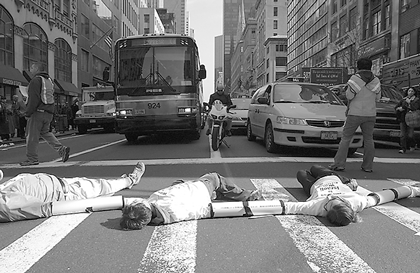Manhattan DA fails in effort to jail non-violent protesters
The right to protest in the streets of New York City, a source of considerable legal contention dating back to the Giuliani administration, won an important victory August 1 when four activists were given community service—as has been traditional—instead of jail time for blocking traffic on Fifth Avenue in 2003 to protest the Israeli military’s use of bulldozing in March of that year that led to the death of Rachel Corrie, an American working for Palestinian rights.
Manhattan District Attorney Robert Morgenthau had sought incarceration for these defendants. Activists argued that Morgenthau did so to set an example in advance of crowds expected in the hundreds of thousands to protest the Republican National Convention in August 2004, according to a website for the accused, www.M26.org.
Judge Robert Stolz ordered the four convicted defendants—Lysander Puccio, Kate Barnhart, Staci Smith and Steve Quester—to serve 10 days community service, “not of their choosing.” He gave Quester an addition $500 fine because he did not like his attitude. The sentences are being appealed, defense attorney Stephen Edwards said.
Barnhart, who runs Sylvia’s Place, an emergency shelter for homeless lesbian, gay, bisexual and trangendered (LGBT) youth at the Metropolitan Community Church/NY in Midtown, said she felt “great relief” after the sentencing at Criminal Court downtown.
“If we had been sentenced to jail, it would be the first time in anyone’s memory that that had happened for non-violent protest and it would have made people very reluctant to engage in these kinds of actions in the future,” she said.
Barnhart said she was “baffled” that the prosecutor’s office “says it doesn’t have enough money to test DNA samples after people are raped,” but spent considerable resources for three years pursuing these charges against the four and 12 other defendants.
James Kindler, chief assistant district attorney, in a statement to Gay City News, denied that the reason his office sought jail time for these non-violent protesters was to issue a warning to the convention demonstrators expected in August 2004. While Kindler at first disputed the contention that his office did not have the funds to deal with DNA samples, he later acknowledged that they were working on a “backlog.” He insisted that the resources expended on this case were “not extraordinary.”
The protesters on March 26, 2003, chained themselves together outside Bank Leumi, an Israeli company, on Fifth Avenue. They were charged with disorderly conduct, a violation that covers blocking traffic, and obstructing government administration, a class A misdemeanor. The DA offered no opportunity to have more serious misdemeanor charge dropped in exchange for guilty pleas to the lesser charge.
Stolz, who acknowledged being on his synagogue’s Israel Committee, presided over a five-day trial and all defendants were found guilty in 2004. In May of last year, 12 of them received what M26.org said are unusually harsh sentences for non-violent offenders—one year conditional discharges, up to 10 days of community services and $100 in court costs. Two of those defendants were fined an additional $500 because they had also been arrested in a May 2003 protest dubbed Operation Homeland Resistance.
In its prosecution, the DA’s office in its sentencing letter also cited eight defendants for “previous contacts with the criminal justice system,” referring to cases where they had received ACDs, or adjournments in contemplation of dismissal, if they were not re-arrested within six months. Those ACDs had transpired more than six months prior to the arrests in the Israeli protest and no public record of them should have been available. The unsealing of these records created an uproar among civil libertarians and the state’s highest court ruled on July 6 that the DA’s actions were improper.
The courtroom was packed Monday with more than 100 supporters of the defendants, including allies from ACT UP.
During the defendants’ statements in court, Stolz frequently rolled his eyes and tapped his pen impatiently. In sentencing them, he cited ACT UP oral histories recorded by Barnhart and Quester—introduced into evidence by the prosecution. Stolz called Quester “self-absorbed and narcissistic.”
During his statement to the court, Quester, a teacher, said, “Any social scientist who has done oral history would be astonished by this invasive abuse of oral history by the courts,” and indeed Sarah Schulman, the author, playwright and activist who coordinated the ACT UP oral history project, denounced Morgenthau specifically for using the material. Quester did, however, acknowledge cringing at some of the flip remarks he made about his activism in the oral history.
Puccio protested, “Do not punish principled non-violent and peaceful acts as if they were reckless violent ones.”
Smith said, “If my predecessors in ACT UP had not participated in civil disobedience then people with AIDS in this country would not have access to affordable life-saving medication.”
Barnhart complained that Larry Glasser, the assistant district attorney in the case, cited her 1989 participation in both ACT UP’s action at the New York Stock Exchange, a protest she characterized as “a desperate effort to lower the prices of AIDS drugs,” and in a 1999 protest against what she termed “the horrendous killing of Amadou Diallo,” an unarmed African immigrant shot 41 times and killed by police officers in the Bronx.
gaycitynews.com


































